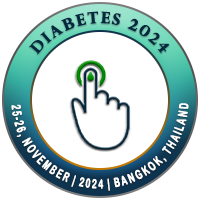
Marlen A. Álvarez-Castillo
Hospital General de México, MexicoTitle: Recommendations for the management of patients with thyroid disease facing COVID-19
Abstract
Introduction: The effects and presence of other
coronaviruses in the hypothalamic-pituitary-thyroid
system have been demonstrated in previous epidemics,
it’s possible that the severe acute respiratory syndrome
coronavirus 2 (SARS-CoV-2) may also affect them.
Changes in thyroid hormone levels may also be related
to the presence of sick euthyroid syndrome or thyroid
dysfunction in the seriously ill patient, which is why the
correct interpretation of these alterations is important
when performing a thyroid profile. Although the currently
known repercussions of SARS-CoV-2 on the thyroid
system are limited, there are several situations in the
management of thyroid disease that require
observations or recommendations during the health
emergency.
Objective: To provide guidance on thyroid disease
management and special considerations during the
coronavirus disease 2019 (COVID-19) pandemic.
Discussion: Routine screening with a thyroid profile is
not recommended in patients with acute disease,
except in cases where there is a strong suspicion of
thyroid alteration. In case of use of thionamides for
hyperthyroidism and manifestations of COVID-19, a
differential diagnosis with agranulocytosis and
neutropenia must be made. Patients with thyroid
ophthalmopathy being treated with glucocorticoids or
other immunosuppressive drugs should exercise
extreme hygiene measures. Hypothyroid patients
should continue the same treatment with established
form and dosage. Fine needle aspiration biopsies for
thyroid nodular disease should be deferred. Elective
thyroid surgical procedures should be avoided as
should the administration of radioactive iodine. Most of
the consultations related to thyroid dysfunction can be
modified electronically, following the regulations
established in this regard.
Conclusion: Studies are required to evaluate the direct
effects of SARS-CoV-2 on thyroid tissue and the thyroid
function axis, as well as the clinical impact that this may
represent. We issue these recommendations regarding
some situations that may arise in the care of patients
with thyroid disease, which may require modification if
new information appears
Biography
Dr. Alvarez is Honduran, a specialist in internal medicine graduated from the Universidad Nacional autónomos{oma
National Autonomous University of HOnduras, in addition to being a subspecialist in endocrinology and a high specialty
in thyroid diseases both from the National Autonomous University of Mexico. Co-author of several publications and has
participated in conferences with free papers and clinical cases. He currently works as a doctor at the Santa Maria
Medical Center, Choluteca, Honduras.

